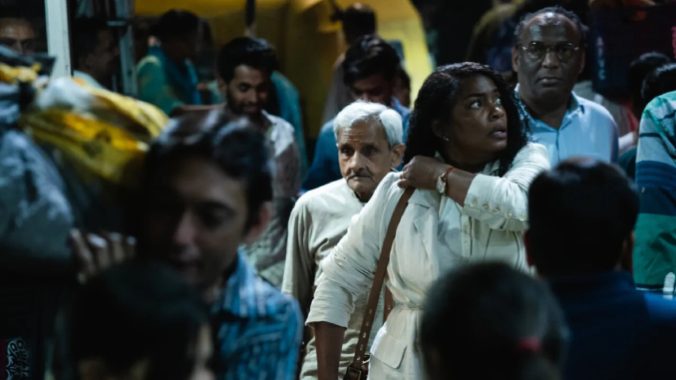In Origin, writer/director Ava DuVernay once again tackles complex themes about social injustice, posing the question: How do we confront oppression? To find the answer, DuVernay puts the spotlight on nonfiction author Isabel Wilkerson, the influential subject of a bold, galvanizing account of the interconnected roots of hate.
Origin chronicles the research and life experiences of the Pulitzer-winning Wilkerson that inspired her bestselling book Caste: The Origins of Our Discontents. The film follows Wilkerson (Aunjanue Ellis-Taylor) as a series of political and personal events lead her on expeditions to Germany and India to explore the concept of caste—a stratification system that divides society into a series of identity-based hierarchies. The murder of Trayvon Martin sets Wilkerson’s research in motion, stirring her investigation of how systemic racism in America relates to oppressive systems throughout the world. Origin starts with a harrowing reenactment of the events leading up to Martin’s murder, followed by audio of a real 9-1-1 call that records the gunshot that killed Martin—a blunt, unsanitized scene that sets an urgent tone. The reenactment, the first of many throughout the film, intensely and accurately sounds a reverberation of American caste, emphasizing the importance of Wilkerson’s research. It’s important to note that Sybrina Fulton, Martin’s mother, is thanked in the film’s credits.
Like its subject, Origin adopts a journalistic lens, spending less time constructing Wilkerson’s own narrative and instead letting her historical inspirations speak for themselves. The film offers informative examples of caste systems throughout history and the individuals who defied them: A couple targeted by the Nuremberg Race Laws in Nazi Germany, Black anthropologists Elizabeth and Allison Davis, who co-wrote the revolutionary Deep South: A Social Anthropological Study of Caste and Class in 1941 and B. R. Ambedkar, an Indian man born into the Dalit caste—the lowest caste of India—who, despite the adversity that faced him, drafted the Indian Constitution.
DuVernay shows creative versatility in these interwoven sequences, building stakes and intriguing characters within these well-designed, thoroughly fleshed-out vignettes. With impressive costuming and scenic details, these fleeting and sentimental stories colorfully illustrate Wilkerson’s narration of the past. Though the incorporation of loosely-related characters in these historical reenactments can sometimes clutter and distract from Wilkerson’s central narrative, they add needed context to the story of Caste: The Origins of Our Discontents and make Wilkerson’s thesis more digestible.
However, the film’s representations of people subjugated by caste are not always effective. Origin does not shy away from showcasing violent oppression in excruciating detail, but the depictions ramp up in violence towards the end. In a single montage, as Wilkerson lays out the conclusions of her research via voiceover, we’re shown the inside of concentration camp, the horrors of a Middle Passage ship, the mistreatment of a Dalit and the lynching of a Black man in the American south. The series of trauma tropes incorporated here reduce a monumental moment into excessive, crude depictions of suffering. This climactic scene aims to expose the byproducts of caste for those who have never suffered under it, but lacks the sensitivity to successfully honor those brutalized under oppressive systems. Sequences of resistance, however, which opt to champion individuals like Ambedkar, the Davises and Wilkerson herself, have a more potent result, echoing Wilkerson’s mission and representing individuals afflicted by the caste system as beacons of resilience rather than tokens of suffering.
Among the many timelines and tragedies the film helms, Origin’s time spent exploring Wilkerson’s family and personal life secures an emotional anchor, divulging the taxing process of reviewing history, especially when one shares a connection with it. Looking inward at her dynamics with her mother and husband—to whom Caste: The Origins of Our Discontents is dedicated—Wilkerson reckons with her own relationship to caste as a Black woman, and examines how her experiences differ from that of her white husband (Jon Bernthal) and her elderly mother (Emily Yancy), the latter of whom insists that surrender is the only means of survival in America.
Wilkerson’s life, which unfolds tragically throughout the film, echoes her desire to recite history and reminds us that the events of the past live within us. DuVernay’s writing and Ellis-Taylor’s subtle yet full-bodied performance culminate in a warm, powerful protagonist tethered to her work as she reckons with the grief of history and her own losses. Ellis-Taylor brings great emotional depth to the forefront of a career-defining role, manifesting Wilkerson’s pain and determination in scenes of cathartic emotional release and quiet contemplation alike.
DuVernay has already documented history with projects like Selma and 13th, but Origin is her most daring feat yet. This tribute to Wilkerson instills the importance of questioning the oppressive systems established in the past, and looking inward towards our own place within these systems. DuVernay gives context to Wilkerson’s complex ideas about oppression, making a vivid film that feels timeless—yet incredibly relevant.
Director: Ava DuVernay
Writers: Ava DuVernay
Starring: Aunjanue Ellis-Taylor, Jon Bernthal, Vera Farmiga, Audra McDonald, Niecy Nash-Betts, Nick Offerman, Blair Underwood
Release Date: January 19, 2024
Sage Dunlap is a journalist based in Austin, TX. She currently contributes to Paste as a movies section intern, covering the latest in film news.
